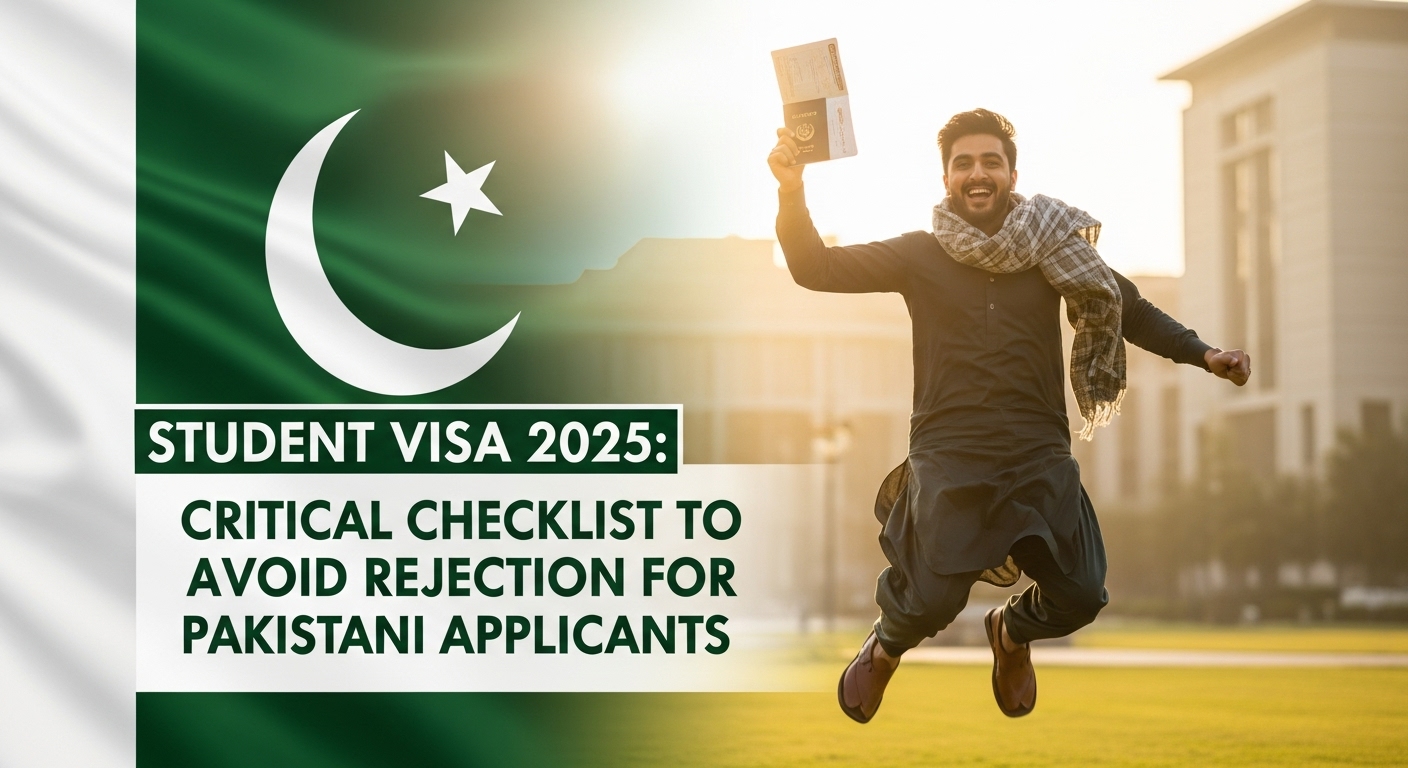Embarking on the journey to obtain a student visa for studying abroad is an exciting dream for many Pakistani students. However, the path to gaining admission and a visa can often feel like navigating a maze of paperwork. This comprehensive guide is designed to be your trusted companion, detailing every document you’ll need, why it’s important, and how to obtain it right here in Pakistan. We’ll cover everything from your academic transcripts to financial proofs, ensuring you’re well-prepared for each step.
Understanding the Importance of Each Document
Before we dive into the specifics, it’s crucial to understand why each document is required. Universities and visa authorities need these papers to verify your identity, academic history, financial capability, and genuine intent to study. Missing even one small detail can lead to delays or even rejection. Being meticulous and preparing everything well in advance will save you a lot of hassle.
Phase 1: Academic Documents
These are the first set of documents universities will ask for when you apply. They reflect your educational journey and academic achievements.
| Document / Requirement | Key Actions & Tips |
|---|---|
| Academic Transcripts & Certificates | Gather mark sheets and degrees from Matric/O-Levels to highest degree. Request official transcripts from schools/universities. Ensure originals are sealed and signed. Start early. |
| Attestation of Educational Documents | IBCC: For Matric, Inter, O/A Levels; get equivalence if needed. HEC: For Bachelor’s and higher; apply online, book appointment, or use courier. MOFA: Final attestation for international recognition. Ensure names match across documents. |
| School Leaving & Character Certificates | Obtain from last attended school/university. Must be on official letterhead, stamped, and signed. May need DEO/HEC/MOFA attestation depending on country. |
| English Language Proficiency Test Scores | Take IELTS, TOEFL, PTE, or Duolingo unless waived. Register early and prepare in advance. Strengthens applications and may be required for visa. |
| Statement of Purpose (SOP) / Personal Essay | Write a tailored essay explaining academic journey, program choice, and career goals. Draft multiple versions, research program, and avoid generic SOPs. |
| Letters of Recommendation (LORs) | Obtain 2–3 letters from professors or supervisors. Provide resume/SOP draft and submission instructions. Should be on official letterhead, signed, and possibly sealed. |
| Curriculum Vitae (CV) / Resume | Summarize education, work, projects, publications, skills, awards. Tailor to program, use professional format, and proofread carefully. |
| Portfolio (for creative fields) | Compile best works with brief descriptions. Follow university guidelines for format (PDF, online, physical). Showcase creativity and skills relevant to program. |
Phase 2: Identification and Personal Documents – Proving Who You Are
These documents establish your identity and citizenship.
| Document / Requirement | Key Actions & Tips |
|---|---|
| Valid Passport | Ensure your passport is valid (≥6 months). Apply or renew at passport office; provide CNIC, photo, and previous passport if applicable. Use urgent service if needed and keep photocopies of bio-data page. |
| CNIC / NICOP / B-Form | Maintain a valid CNIC or NICOP (for dual nationals). Minors need B-Form. Apply/renew at NADRA or online via Pak-Identity portal. Avoid expired CNICs. |
| Birth Certificate | Obtain original from Union Council or municipal authority. Required for identity verification, especially for minors or discrepancies in other documents. |
| Family Registration Certificate (FRC) | Get from NADRA (office or online). Needed for embassy verification of family structure and sponsorship. Requires CNICs of family members. |
| Police Character Certificate | Apply at local Police Khidmat Markaz or District Police Office. Provide CNIC, passport copy, and affidavit. Background check conducted; may need certificates from multiple districts. |
| Medical Examination / Health Certificates | Undergo examination at embassy-approved clinics. Tests may include physical, blood tests, X-ray, TB screening, and polio vaccination proof. Appointment, passport, photos, and sometimes acceptance letter required. |
Phase 3: Financial Documents – Proving Your Ability to Pay
Financial documents are crucial for demonstrating that you can afford your tuition and living expenses abroad.
| Document / Requirement | Key Actions & Tips |
|---|---|
| Bank Statements | Obtain official statements (yours or sponsor’s). Must show sufficient funds for tuition, living expenses, and insurance. Account should hold funds for required duration (e.g., 28 days for UK, 3–6 months for Canada/Australia). Must be original, stamped, and signed. Avoid sudden large deposits. |
| Education Loan Sanction Letter | If using a loan, get a formal letter from the bank stating the loan amount, terms, and that it’s sanctioned for your overseas education. |
| Scholarship Letter | If applicable, obtain an official letter stating scholarship amount, coverage (tuition, living), and duration. Strengthens visa application. |
| Sponsor’s Affidavit of Support / Sponsorship Letter | Sponsor must provide a notarized letter declaring financial support. Include full name, relationship, contact info, financial capacity (with bank statements), and proof of relationship (FRC, birth certificate). Some embassies require MOFA attestation. |
| Income Tax Returns / Salary Slips / Property Documents (Sponsor) | Provide recent ITRs, salary slips, or asset ownership documents to demonstrate sponsor’s financial stability. Originals or certified copies are preferred. |
Phase 4: Visa Application Specific Documents
Once you have your university acceptance, you’ll move on to the visa application. Many of the above documents will be required, along with these additional ones.
| Document / Requirement | Key Actions & Tips |
|---|---|
| Confirmation of Acceptance for Studies (CAS) / I-20 / Letter of Acceptance | Receive after formal admission and initial deposit payment. Needed for student visa application. Issued electronically or physically. |
| Visa Application Form | Complete accurately online or on paper. Ensure consistency with other documents. Check all sections carefully. |
| Visa Application Fee Payment Receipt | Pay the required fee through the embassy-approved method. Keep the official receipt as proof. |
| Passport-Sized Photographs | Recent photos meeting embassy specifications (background, size, face forward, no glasses if required). Get from a professional studio. |
| Proof of Accommodation | On-campus: provide confirmation letter. Off-campus: tenancy agreement. Staying with relatives/friends: invitation letter, their ID, and proof of residence. Temporary booking can be used if long-term arrangements aren’t finalized. |
| Travel Insurance | Purchase comprehensive insurance covering health and travel for the entire study period. Must meet destination country requirements. |
| Parental Consent Form / Guardianship Documents (for minors) | Notarized consent from both parents, including CNIC copies and guardian details abroad. Ensures safety and legal approval. |
| Academic Technology Approval Scheme (ATAS) Certificate (UK-specific) | Apply online if studying sensitive subjects in the UK. Required for certain science, engineering, or technology courses. Apply early due to processing time. |
Phase 5: Post-Arrival Documents (Important to Keep Safe)
While these are not required for your application, they are crucial once you land in your destination country.
| Document | Why to Keep It |
|---|---|
| Offer Letter / CAS / I-20 | Needed at the port of entry to confirm your purpose of travel to immigration officers. |
| All Original Academic Documents | Universities or immigration authorities may request original degrees, transcripts, or certificates, especially for post-study work visas. |
| Financial Documents | Bank statements, sponsorship letters, or scholarship letters may be requested again at the border or for visa extensions. |
| Passport and Visa | Primary travel and identity documents; essential for entering your destination country. |
| Medical Records / Prescriptions | Important if you have ongoing medical conditions; helps in case of emergencies or when filling prescriptions abroad. |
General Tips for Pakistani Students
- Start Early: The entire process, from research to visa application, can take months. Begin gathering documents and applying for attestations well in advance.
- Keep Multiple Copies: Always have several photocopies and digital scans of every document.
- Organize: Keep all your documents neatly organized in folders.
- Check Specific Requirements: Always cross-check the exact document requirements with your chosen university and the embassy/consulate of your destination country, as they can vary and change.
- Professional Help: Consider consulting reputable education consultants in Pakistan. They can guide you through the process, help with applications, and advise on visa requirements.
- Consistency: Ensure all your documents (name, date of birth, father’s name) are consistent. Any discrepancies can cause major problems.
- Translations: If any document is not in English, you will need a certified translation.
Preparing for study abroad is a significant undertaking, and managing the required documents can be daunting. By following this comprehensive guide and staying organized, you can navigate the process smoothly and confidently pursue your academic dreams abroad. Good luck!
Resources
- Higher Education Commission (HEC) Pakistan: For degree attestation.
- Inter Board Committee of Chairmen (IBCC): For Matric, Inter, O/A-Levels attestation and equivalence.
- Ministry of Foreign Affairs (MOFA) Pakistan: For general document attestation.
- Directorate General of Immigration & Passports: For passport services.
- National Database and Registration Authority (NADRA): For CNIC, NICOP, B-Form, FRC.
- British Council Pakistan: For IELTS registration and information.
- ETS Global: For TOEFL iBT registration and information.
- Pearson VUE: For PTE Academic registration and information.
- Duolingo English Test: For online English proficiency testing.
- Approved Panel Physicians (check respective embassy websites): For medical examinations.
- Punjab Police Khidmat Markaz (PKM) or relevant provincial police websites: For Police Character Certificates.




